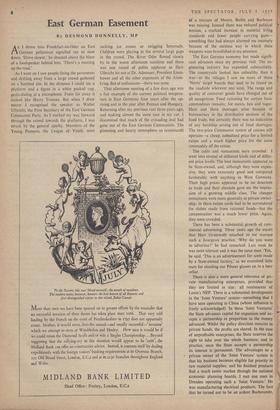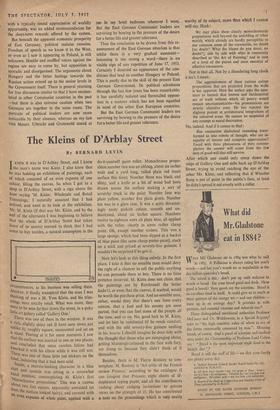East German Easement
By DESMOND DONNELLY, MP As I drove into Frankfurt-on-Oder an East German policeman signalled me to slow down. 'Drive slower,' he shouted above the blare of a loudspeaker behind him. 'There's a meeting up the road.'
As I went on I saw people lining the pavements and drifting away from a large crowd gathered on a bombed site. In the distance I could see a platform and a figure in a white peaked cap, gesticulating at a microphone. From far away it looked like Harry Truman. But when I drew nearer I recognised the speaker as Walter Ulbricht, the First Secretary of the East German Communist Party. As I worked my way forward through the crowd towards the platform, I was struck by the general apathy. Members of the Young Pioneers, the League of Youth, were sucking ice cream or swigging lemonade. Children were playing in the several large gaps in the crowd. The River Oder flowed slowly by in the warm afternoon sunshine and there was one round of polite applause as Herr Ulbricht hit out at Dr. Adenauer, President Eisen- hower and all the other exponents of the Atom- krieg. But of enthusiasm—there was none.
That afternoon meeting of a few days ago was a fair example of the current political tempera- ture in East Germany four years after the up- rising and in the year after Poznan and Hungary. Returning after my previous visit three years ago, and making almost the same tour in my car, I discovered that much of the crusading zeal had gone out of the East German Communists. The glistening and hearty atmosphere so reminiscent of a mixture of Messrs. Butlin and Buchman was missing. Instead there was reduced political tension, a marked increase in material living standards and fewer people carrying guns— something that had always alarmed me intensely because of the careless way in which these weapons were brandished in my presence.
The East German economy has made signifi- cant advances since my previous visit. The en- gineering industry has expanded substantially. The countryside looked less unhealthy than it was—in the villages I saw no more of those 'Norm' target boards that used to be found on the roadside wherever one went. The range and quality of consumer goods have changed out of all recognition. Food rationing for certain basic commodities remains; for meats, fats and sugar. Here and there shortages arise because of bureaucracy in the distributive sections of the food trade, but certainly there was no indication of any hardship arising out of food shortages. The two-price Communist system of rations still operates—a cheap, subsidised price for a limited ration and a much higher price for the same commodity off the ration.
The cafes and restaurants were crowded : I went into several of different kinds and of differ- ent price levels-. The best restaurants appeared to be State-owned, and, although they-were expn- sive, they were extremely good and compared favourably with anything in West Germany. Their high prices appeared to be no deterrent to trade and their clientele gave me the impres- sion of a growing middle class. The cheaper restaurants were more generally in private owner- ship; in them ration cards had to be surrendered for dishes made from rationed foods—but the compensation was a much lower price. Again, they were crowded.
There has been a substantial growth of com- mercial advertising. Three years ago the escort that Herr Grotewohl attached to me scorned such a bourgeois practice. 'Why do you want to advertise?' he had remarked. Last week he was most tolerant and it was the same man. 'Yes, he said. 'This is an advertisement for scent made by a State-owned factory,' as we examined little mats for standing our Pilsner glasses on in a beer cellar.
There is also a more general tolerance of pri- vate manufacturing enterprises, provided that they are limited in size : all reminiscent of Lenin's NEP. There is a substantial development in the 'Joint Venture' system—something that I have seen operating in China (whose influence is freely acknowledged). In these 'Joint Ventures' the State advances capital for expansion and ac- cepts a partnership in proportion to the money advanced. Whilst the policy direction remains in private hands, the profits are shared. In the case of unprofitable enterprises, the State reserves the right to take over the whole business; and in practice, once the State accepts a partnership its interest is permanent. The advantages to a private owner of the 'Joint Venture' system is that his business becomes eligible for priority in raw material supplies; and his finished products find a much easier market through the national economic planning boards. I met one man in Dresden operating such a 'Joint Venture.' He was manufacturing electrical products. The fact that he turned out to be an ardent Buchmanite, with a typically sound appreciation of worldly opportunity, was an added recommendation for the short-term rewards offered by the system.
But beneath the apparent economic prosperity of East Germany, political malaise remains. Freedom of speech as we know it in the West, or even as I saw it appearing in Poland, is still unknown. Hostile and muffled voices against the regime are easy to come by, but opposition is sporadic and disorganised. The arguments about Hungary and the bitter feelings towards the Russian action extend up to the senior levels in the Government itself. There is general yearning for free discussion similar to that I have encoun- tered in other Communist countries in the past —but there is also extreme caution when two Germans are together in the same room. The portraits of political leaders are now more noticeable by their absence, whereas on my last visit Messrs. Ulbricht and Grotewohl stared at
me in my hotel bedroom wherever I went. But the East German Communist leaders are surviving by bowing to the pressure of the desire for a better life and greater tolerance.
Thus the conclusion to be drawn from this re- assessment of the East German situation is that whilst there is a very gradual easement— loosening is too strong a word—there is no visible sign of any repetition of June 17, 1953. Certainly I detected no appearance of the con- ditions that lead to another Hungary or Poland. This is partly due to the skill of the present East German Government. Its political adroitness through the last few years has been remarkable; it has carefully isolated and forestalled opposi- tion in a manner which has not been equalled in most of the other East European countries.
But the East German Communist leaders are surviving by bowing to the pressure of the desire for a better life and greater tolerance.















































 Previous page
Previous page